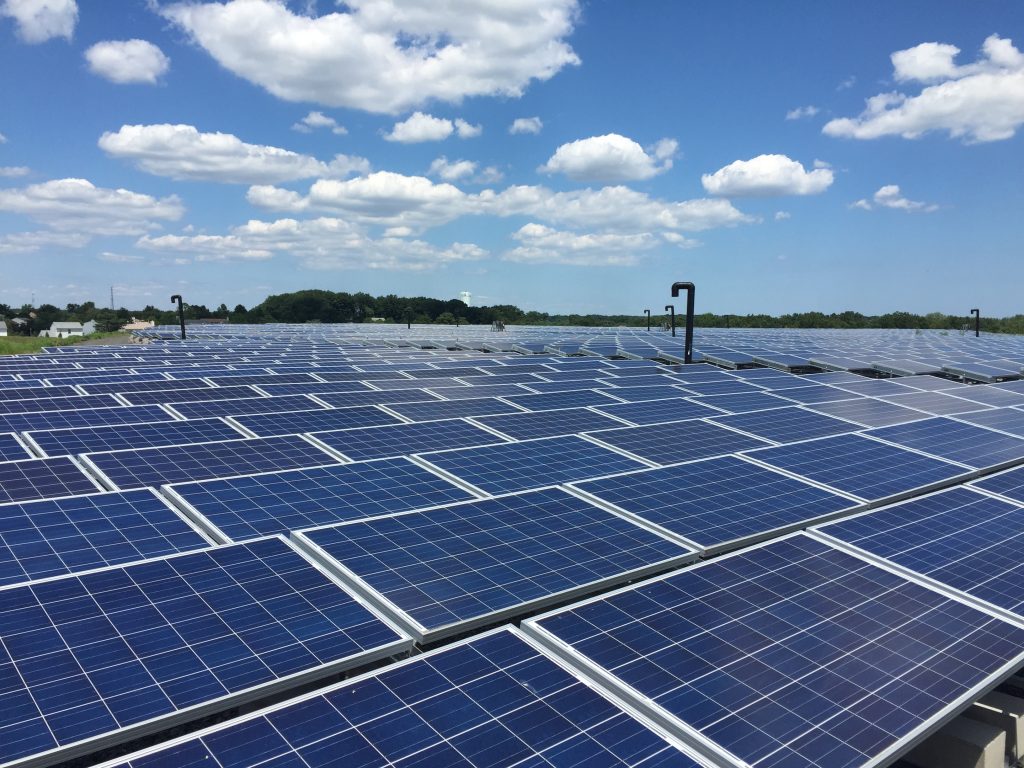
Solar panels at the former French’s Landfill site in Brick. (Photo: Daniel Nee)
The first round of testimony at a Toms River planning board meeting Wednesday night shed more light on a proposed solar field at the former Ciba-Geigy chemical site, but also exposed some concerns from neighboring residents.
The solar field is planned to take up about 117 acres of the approximately 1,200 acre site. It will include up to 92,000 individual solar panels and produce between 30 and 35 megawatts of power, said project engineer Joseph Dietrich, who provided the bulk of testimony before the quasi-judicial body that will be one of several agencies that will need to sign off on the project.
While the project will take up far less acreage than Solar Star, America’s largest solar farm which straddles the border between Los Angeles and Kern counties in California, the Toms River site may end up being the largest array in New Jersey and the largest of its kind – built on a Superfund site – in the nation.
Dietrich said his employer, Toms River Merchant Solar LLC, a holding company for EDF Renewables, has negotiated a 40-year lease with BASF, which gained ownership of the Ciba-Geigy site through a series of corporate mergers and acquisitions. The project must also receive approval from the state Department of Environmental Protection and the federal EPA, which has final jurisdiction over the Superfund site, before the array can be constructed – in addition to local planning approval.
The Ciba-Geigy site manufactured chemical dyes for decades, leading to significant groundwater contamination at the former plant. One portion, lot 6.03 on the tax map, the site of the pollution, which will not be fully remediated for up to another 20 years. Dietrich testified that, in building the solar array, no soil from the contaminated area will be used, and in fact, the soil in the area of the proposed array is the source of clean soil that has already been used in the remediation. To alleviate concerns from some board members and residents, the company volunteered to forego regrading the site and utilizing a different technique that has yet to be presented.
“We have a specific design to avoid any of the existing site soils,” Dietrich said.
The solar array is proposed to include up to three separate solar array configurations: a 28 megawatt grid-supply array, a 2 megawatt net-metered array, and a 5 megawatt community solar array. It will be connected into the electrical grid using existing power lines and transformers at the site will be identical to those mounted on a regular utility pole.
The company would not divulge – and specifically said it may be innapropriate to discuss – whether or not the township may be able to purchase power directly from the site to reduce its electricity costs, as has been the practice in other towns where arrays have been built. About 2 megawatts of capacity will be used directly by BASF to power the ongoing cleanup effort.
About two-dozen residents came to the planning board meeting, but only a few spoke. Those who spoke were mainly from neighborhoods bordering the site off Oak Ridge Parkway. They expressed concern over the aforementioned grading plan, but also over security and fire risk.
EDF will build a seven-foot fence around the site, which Dietrich said was standard practice for such a facility. Residents said BASF security consisted of a patrol van that drives by occasionally and was insufficient. No one from the company was on hand at the hearing.
Another project engineer, Thomas Payne, said he has never seen a fire break out in any of the projects he’s worked on, but testified that there are no hazardous substances in the panels proposed for the project. Board members were concerned, however, after Payne said it might take EDF representatives 24 hours to physically visit the site if a fire were to break out. Toms River firefighters would respond and would be trained to use an emergency shutoff system. Sensors trigger warnings, Payne said, but officials were concerned over the speed at which those warnings would be relayed to the fire service.
Testimony will resume at the Oct. 16, 2019 planning board meeting. Board members requested EDF’s professionals address the issues on fire risk and security, as well as a replacement plan for grading, by the time the next meeting occurs.

Advertisement

Seaside Heights & Seaside Park
In Seaside Heights, A $50M Flagship Building Rises Over the Boulevard in a Famed Location

Police, Fire & Courts
Ocean County Sheriff Establishes Drone Command Center in Seaside Heights Amid New Video








